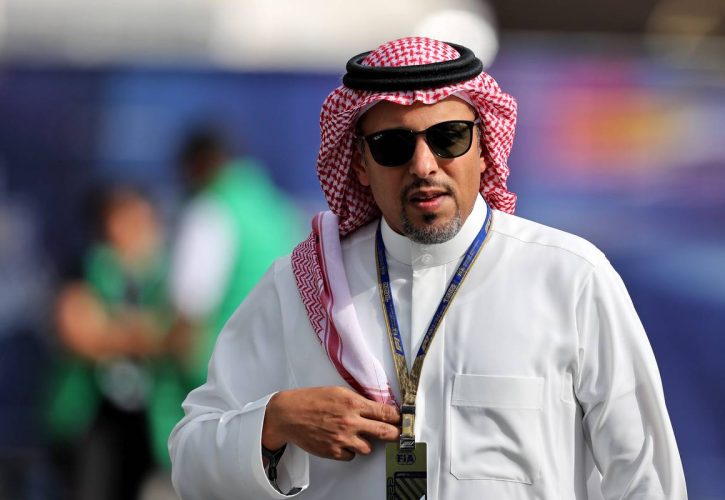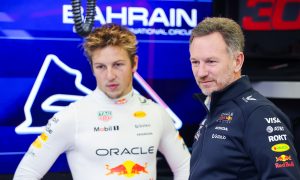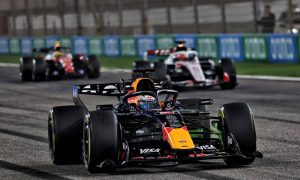
As Formula 1 prepares for this weekend’s event in Saudi Arabia, the kingdom is signaling ambitions that extend far beyond hosting a race.
Prince Khalid bin Sultan Al-Abdullah Al-Faisal, chairman of the Saudi Automobile and Motorcycle Federation, has revealed Saudi Arabia’s interest in acquiring a Formula 1 team, a move that could cement the nation’s growing influence in the sport.
With investments already fueling partnerships like Aramco’s sponsorship of Aston Martin and the Public Investment Fund’s involvement in Formula E, team ownership would mark a bold new frontier.
A Saudi-Owned F1 Team: ‘Why Not?’
“I mean, there is a space available,” Prince Khalid said during a video call with reporters ahead of this week’s race in Jeddah, noting the potential for a Saudi-led squad.
“There are only 11 out of 12 and also potentially one or two teams that might be for sale in the future. I mean, it could happen.”
The Prince’s comments highlight a strategic opportunity, with the F1 grid not yet at its maximum capacity and whispers of existing teams being open to offers. Saudi Arabia, flush with resources and a vision to diversify its global footprint, sees team ownership as a logical next step.
A Strategic Investment Opportunity
The prospect is not merely about national pride — it's about business. With F1 continuing to explode in global popularity, Prince Khalid pointed to the sport’s increasing financial appeal for investors.
“If you see the growth, first of all. If you're going to buy a Formula 1 team, then people will buy it to make money out of it, especially if it's going to be bought by one of the PIF companies,” he explained.

The Public Investment Fund, a powerhouse behind Saudi Arabia’s economic diversification, could spearhead the acquisition, leveraging F1’s expanding global reach.
“So we see there is a lot of Formula 1 now reaching new markets, the sales are globally increasing, and we saw the partnership with Aramco and Aston Martin,” he added, pointing to the kingdom’s existing ties to the sport as a foundation for deeper involvement.
Yet, the prince is clear that any move must be calculated.
“All directions say that maybe soon Saudi can, if they see if it's feasible, if it makes sense, then why not? I mean, nobody dislikes making money. So if you can make money out of Formula 1 - I think it's very tricky.
“You need to know exactly which team to buy and who to partner with and who will manage this,” he cautioned.
The stakes are obviously high – choosing the right team, securing competent management, and ensuring competitive success require precision.
“The decision is very difficult. It's not easy to say which team to buy and how you're going to manage it. But we have a lot of interest; we're hosting Formula 1, sponsoring teams.

Mercedes-AMG team boss and co-owner Toto Wolff with Prince Khalid bin Sultan Al-Abdullah Al-Faisa
“So I wouldn't be surprised if we see an announcement for a Saudi team and personally, I would like to see a Saudi team,” Prince Khalid admitted, his personal passion for a Saudi-branded outfit evident.
“But if I'm in Saudi Arabia or one of the Saudi companies will be involved in one of the teams, I would like them, I mean, to do it the right way and be successful. So it's a tricky question, but why not?” he said, underscoring a commitment to excellence.
A Saudi team, backed by the kingdom’s resources and ambition, could aim to compete at the front, elevating the nation’s profile in a sport where prestige is as valuable as profit.
Beyond the Track: A Vision for F1 Dominance
Saudi Arabia’s motorsport journey is already multifaceted. The Jeddah Corniche Circuit, a high-speed street track, has hosted F1 since 2021, while the under-construction Qiddiya circuit promises to redefine the Saudi Grand Prix experience once operational.

But Prince Khalid’s sights are set higher, with aspirations to position Saudi Arabia as a season-opening spectacle.
“This is something that we would like to have,” he said of hosting the first race of the championship.
“But I know that Formula 1, they have commitments. For them, maybe sometimes it's easier for Bahrain to be the opening season because of the testing.
“So there's a lot of things that you consider. But for us, we would like to have the first race.”
Timing and climate also pose challenges.
“It's the weather. We have a very short gap,” Prince Khalid explained.
“Either it's going to be at the end of the season, which some people don't like it to be at the end of. If it's in the middle of the season, it's too hot.
“So that's why we decided…and we know that Qatar and Abu Dhabi, they are at the end of the season.”

The early-season slot suits Jeddah’s milder spring conditions and aligns with commercial goals.
“So the only option we have is with Bahrain and for us, we are fine (with that). We like to be at the beginning of the season. Next year, ideally for us, is in the beginning of the season. Maybe race one or race two. That's the ideal situation for us and our weather here,” he noted.
“Even in terms of sales, for us here in Saudi, the beginning of the season, it's better for us. People are more excited. As I said, domination doesn't help the championship, but hopefully things will change this year and next year.”
Whether it’s through a team acquisition or a shift in calendar placement, one thing is clear: Saudi Arabia is determined to shift from being just another stop on the Formula 1 world tour to becoming a central player in the sport’s future.
Keep up to date with all the F1 news via X and Facebook





